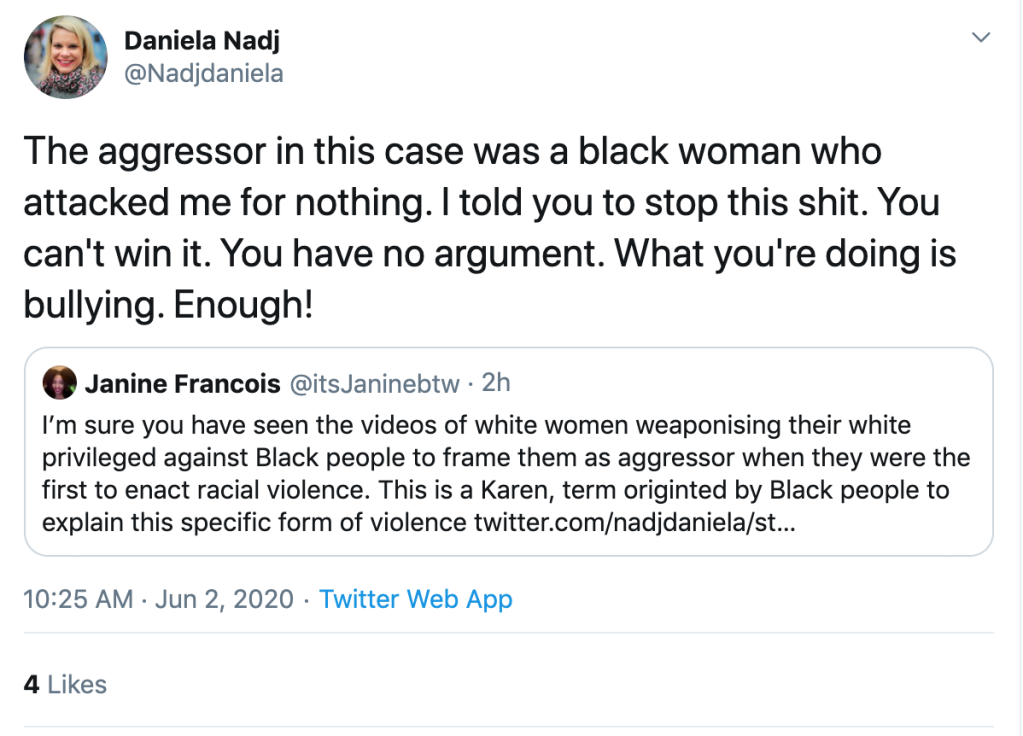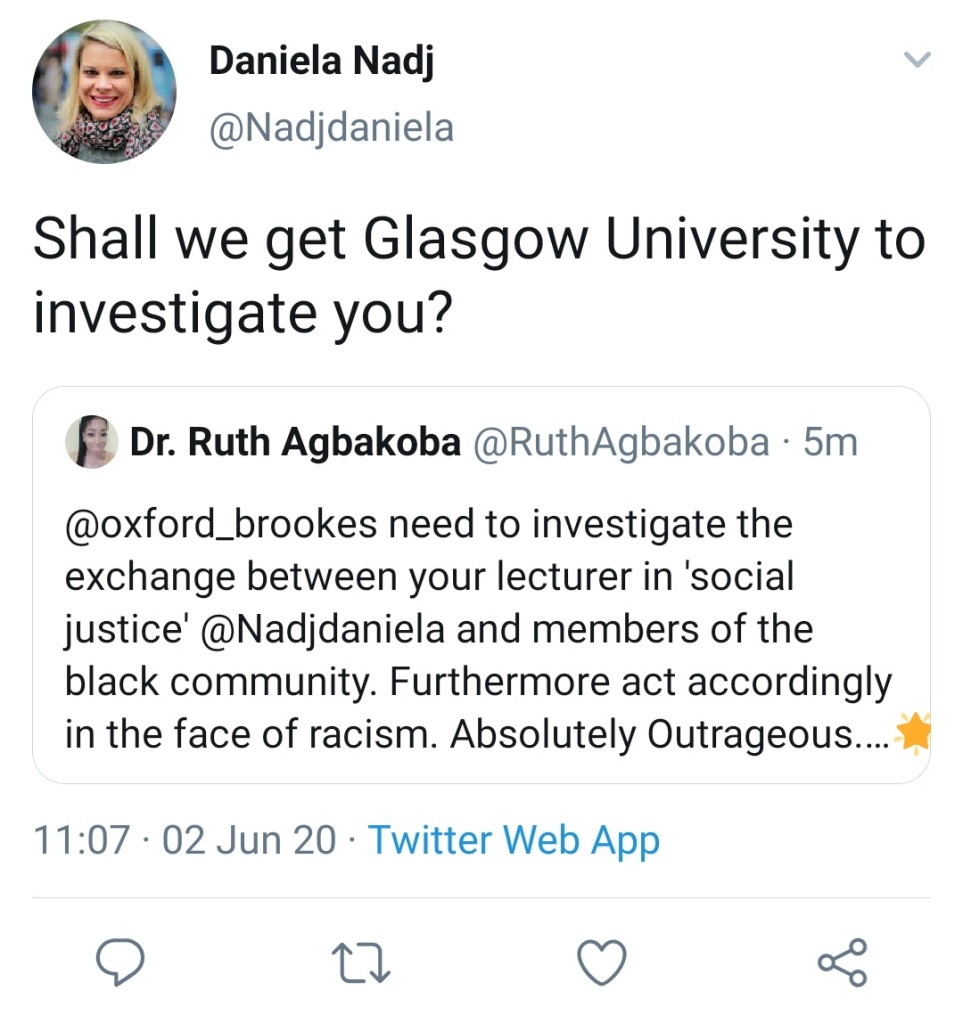
I exist in a time where Black Lives do not matter, where the Black psyche is under attack and our spirits are being ritually murdered. It is often in these times where Black voices are the most vocal, direct and unabashed and it is often in these times where white supremacy is its most violent. But we, Black people, will always push back, it is what we do and we know how to do it well.
I also exist in a time of a global pandemic, where Black people are disproportionally dying due to medical and systemic racism. Many of us are using social media to convene and speak out against anti-black racism. However, witnessing the countless cultural and academic institutions co-opting the #blacklivesmattter as a way to perform their “allyship” all whilst not hiring Black people and or centring our work, was a massive slap in the face. Performative allyship is the worst kind of behaviour because its gaslights Black people, we know our lives do not matter to them, but they are trying to convince us otherwise. Performative allyship propagates lying as solidarity. This co-opting also dissipates the urgency and abruptness of a statement like #blacklivesmattter when it is a strategy used to avoid responsibility for everyday and institutional racism. At least with white silence it punctuates with its directness: they do not care, had never care or will ever care about Black lives, so why change now? After seeing so many of these flimsy and worthless tweets circulate, I was raging. I was livid. I was fuming. I wanted answers. I felt a heat rise from my shins to my collarbone, a heat I intimately know, a heat I call justice and so I decided to tweet the below:

An important aside: I often notice white people re-tweeting me as a way to shift responsibility. I follow Janine, she is outspoken, I am onboard with what she says, I am not the problem. However, this is just another strategy to avoid accountability, they are micro performing the same macro performances white cultural and academic institutions do: performative allyship.
Whilst contrary to popular belief, time is not linear, it’s an abstract process informed by racialised social conditions that intercedes across historical and transnational temporalities. The twitter timeline is perhaps the best embodiment of this. Before writing my above tweet, I had witnessed a violent exchange on twitter, involving a white woman onto a Black Woman. I knew neither of them nor had come across them before, remember time is not linear. So, now my above tweet is picking up traction, it’s also gets retweeted by Daniela Nadj. In the grand schemes of things, Daniela re-tweeting me would be meaningless. However, it did mean something because it was Daniela who was the white woman who engaged in this dialogue with Tana Joseph, the Black Woman. Tana had simply critiqued Daniela for centring Mexico/ US relations within the lenses of Black Lives Matter. Since we are all academics, twitter is our platform and critiquing is what we do, this shouldn’t have been a problem for Daniela, but clearly it was. I found it bizarre she would re-tweet me, considering the above encounter and so I a decided to call it out:

Black Women as “bullies”


What spewed from this engagement were behaviours I and so many other Black and Women of Colour are all too familiar with. What is important to understand about racism, is that it is a system of power that white people have constant access too and can weaponise it whenever they feel like. I want you to imagine racism as free-floating levers that orbit our metaphysical space. white men constantly hold on to their levers with a firm and tight grasp, violently yanking on it to display their power. Whilst white women pretend they do not have access to leavers, they are always somehow just out of reach. Black and Women of Colour know white women well, we see how they sneakily dance their hands around it rims, flirting with it and threatening us with the pull.

Daniela Nadj pulled on many levers to exert her whiteness, she threatened, stereotyped and was abusive to me and countless other Black, Indigenous, People of Colour (BIPOCs). The first act of her racism (and it was racism) was the clear disparity in how she engaged with the Black and Women of Colour critiquing her versus the white people critiquing her. Her second action was deploying racist signifiers of “bullies” who had “attacked her” and “jumped on her,” not only did she repeatedly say this about me and others she never referred to her white challengers in the same way. This language draws on racist stereotypes of Black and Women of Colour as being violent, aggressive, criminals and deviant. Tweets are not superficial activities because they speak to and on the behalf of our societal inequalities. They are our digital mirrors to our “real world” and a reflection of what people truly think. The problem here for Daniela was who was doing the tweeting/critiquing and why this was such an affront to her? Clearly, she does not think Black Women have the right to critique her. After all knowledge is power in academia. Black Women demonstrating our knowledge was a challenge to her power. When a whole group of people are systemically denied entry into academic, a setting that thrives on knowledge production, when Black Women critique (and speak) we are always disrupting this racial boundary. white people like Daniela are often used to our absences but engage with our work as disembodied words divorced from the realities and minds that have produced them. Or as cannibals, only liking Black celebrity academics who can endlessly feed them. Not as agents who can respond and speak back in real time to their aggressions. And so, Daniela pulled a lever to remind me of my place: the aggressor, an anthropological position in which she can locate and understand me from. Therefore, our critiques were not ones of inspiring discourse but was intentionally perceived as inciting violence. white people can only register Black Women’s “speech” as acts of aggression, even though aggression is predicated upon power. I was not being aggressive neither did I cause her any harm (nor did anyone else) and when pressed for such evidence none was provided. This is all immaterial because her myth making process was about bestowing virtuous qualities on to herself, the aggrieved party, the wronged victim: these are the levers which white women pull on to execute white supremacy. This explains why we see countless videos of white women calling the police on to Black people. Within this myth making process, archetypes are produced, the white damsel in distress and the ogre-like Black person. This racialised myth-making is used to harass Black Women like Serena Williams by depicting her as a “hyper-masculine ape” and Maria Sharapova as a dainty whimsical wall-flower. This wider dehumanisation fits Daniela’s myth-making project well, she gets to play the perfect victim in a problem she created. It is why she consistently employed the racist language of “bullying” or “attacking,” she was trying dissolve herself of responsibility and re-centre herself as the victim, she was crying electronical white tears.
“Sisterhood” as white women’s defence

Another strategy Daniela to tried to use was “sisterhood” and how Black and Women of Colour were being un-feminist. white women weaponise “sisterhood” as a tactic to tone police us. This imaginary “sisterhood” that Daniela believes to exist between Black and Women of Colour, functions on white woman speaking and Black and Women of Colour being silent. It is a “sisterhood” that replicates the racial hierarchy between white and bodies of Colour. It is a “sisterhood” that that upholds white supremacy which white women are invested in. It is a “sisterhood” that is for white membership only. Since I and many other Black and Women of Colour challenged her visioning of this “sisterhood” by speaking, she had to put us back in our places. This would also explain her racialising us as “bullies” and “attackers,” and more personally, tweeting me to “shut up.”

This history runs deep from Audre Lorde critiquing second wave white feminists right back to Sojourner Truths “Ain’t I a Woman” speech to the white suffragettes. There has never been any “sisterhood” between Black and white women, not when they were slave owners, complicit in upholding Apartheid and Jim Crow laws and more recently being the 50% who voted for Trump. “Sisterhood” is a myth-making project for white women to exert white supremacy. Daniela demonstrated this “sisterhood” when levelling threats to report Black and Women of Colour to their respective instiutions. We all know how scarcely absent Black and Women of Colour are within the academy, so why would she try to jeopardise our positions? She was pulling on a lever.

An “Apology” without Accountability

Daniela has issued an apology that I do not accept. Firstly, it is an awful apology that does not even begin to recognise the psychic harm she has directly (and indirectly) caused on to me and the other BIPOC. I personally do not believe she is genuinely sorry, she might be sorry for getting caught and for being so public, but it is likely she will do this again, privately. Secondly, she is an academic whose field is in Human Rights, Gender and Social Justice, one would pressume she would have better access to the vocabulary and frameworks to truly reflect on her accountability and reparative actions. The problem here is there are many white academics who are masquerading their racism within social justice discourse where much of this labour and criticality are produced by BIPOCs who are also shut out from the academy. The recolonisation of decolonial discourse by white academics is not only testimony to this but is the face of this cannibalistic culture white supremacist capitalist patriarchy creates. I demand that Oxford Brookes investigates what took place because I and many others were deeply harmed by Daniela’s conduct. More importantly, I have access to recourses of power to raise my concerns about her, this is something many BIPOC students at Oxford Brookes do not have.
I look forward to being updated about upon your outcomes
Signed
Janine Francois, Academic, Activist and Agitator
Solidarity. And I’m sorry you had to go through this.
LikeLike
Thank you Janine. Thank you for being the warrior Queen that you are. This is the first time that I have come across your work and as someone who is new to higher education and anti-racism activism you have blown my mind with how you dissected that experience so accurately in a way I could never fathom articulating or articulating well but my experience not being honoured as a true lived experience and then the accusation of me being the aggressor because I am saying such things against the “wall flower” as you described. This is an amazing dissection that WE ALL relate to 100%!! I’m sorry that you had to experience that but you used your super power for the greater good of self and others and you shall be rewarded Queen. Lots of love sis.
LikeLike
This is disgusting.
I’m standing with you in solidarity.
LikeLike
An amazing dissection of racism. It was painful to read. But blew me away with the depth of the how you were able to delve so deeply into her thinking and expose it. I hope she is fully held accountable for her overt racism. She should never be allowed to interact with young people thinking the way she does. She needs to do a lot of work. All the very best.
LikeLike